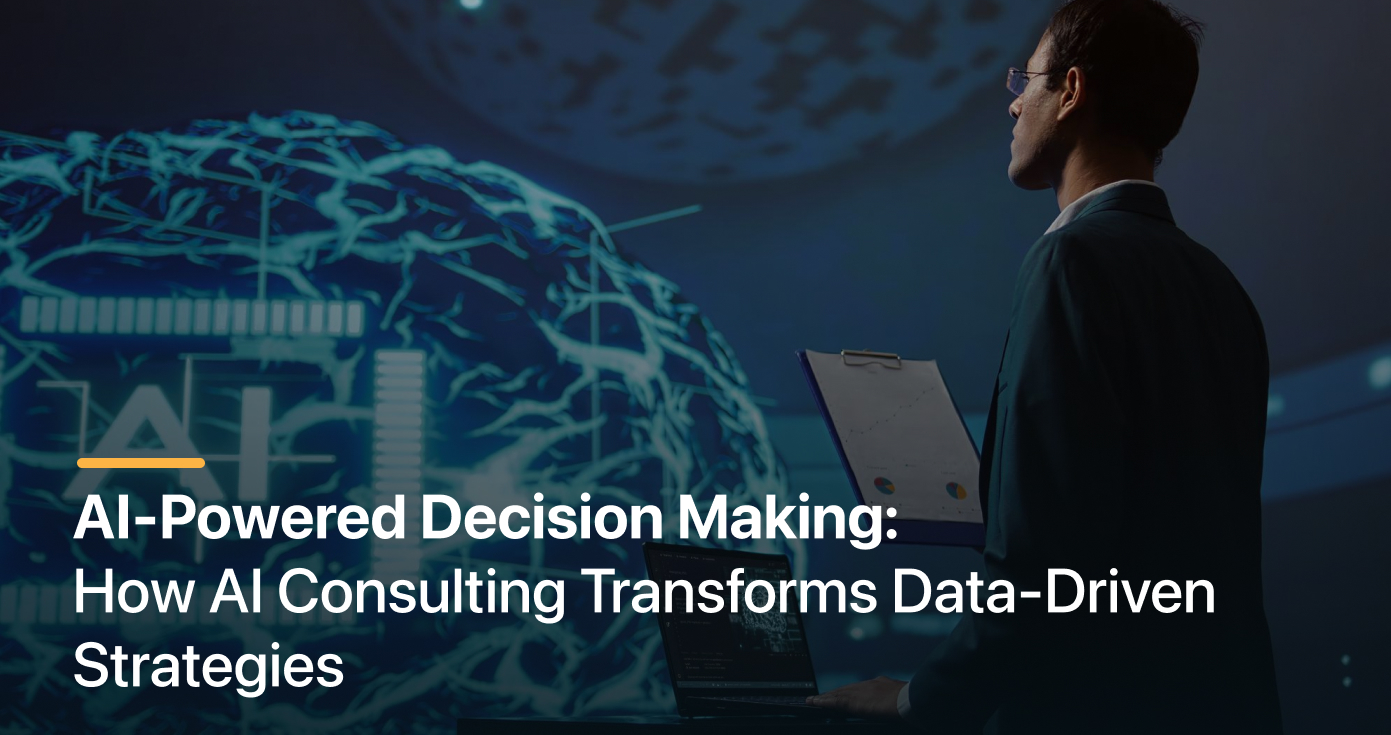In an age where data is the kingmaker for organizations, AI decision-making is gradually becoming a differentiator among competitors. There are still some changes at this stage of the value chain; however, AI consulting services are essential during this transformation because they provide companies with the knowledge and means to successfully implement artificial intelligence. An AI strategy consultant can help organizations use their data to make the right decision at the right time to improve the organization’s operations and achieve its goals. With the increasing application of AI in decision-making across organizations, AI consulting as a practice becomes relevant in reconstructing strategic management, particularly during the formulation and implementation phases.
In this article, we will find out how AI consulting impacts strategy and how it can help businesses deal with complex issues.
AI Consulting Services for Data-Driven Strategies:
Here are points on how AI-powered decision-making transforms data-driven strategies:
- Enhanced Insights: AI consulting services hence leverage enhanced rates of analytics and machine learning algorithms in wading through masses of data. Such patterns and trends often cannot be detected by human miners, and an analysis of the extracted information provides comprehensive insights into the organizations’ decision-making processes. Such a level of understanding enables companies to fully operate based on the best choices given market trends and customers’ wants.
- Real-Time Data Processing: An advantage of using AI in decision-making is that real-time data processing can be achieved. This capability helps the organization to be well equipped to tackle this within the market place and operations. For instance, sales trends or customer feedback may enable a company to fine-tune its approaches in response to constantly fluctuating dynamics and make the best out of profitable shifts.
- Predictive Analytics: An AI strategy consultant can then set predictive analytics models that will assess prior trends so that future behaviors can be predicted. It also avoids situations where companies make decisions with the hope of avoiding certain consequences when they might just be inevitable. For instance, vendors can anticipate the quantity of stocks likely to be required mainly during festive times, which implies little or no inventory depletion and subsequently greater sales.
- Improved Accuracy: They help minimize the potential for a human factor to influence the interpretation of data as well as decision-making. The use of recommendations based on algorithms instead of the human forecast makes it possible to achieve higher rates of accuracy when making strategic decisions in organizations. It not only improves the efficacy of the decisions but also increases assurance with the results arrived at by these processes.
- Customization of Strategies: Based on customer data, business decisions through artificial intelligence can create a specialized marketing plan to meet individual customer needs. For example, by AI, customers’ behaviors can be analyzed and different marketing campaigns can be suggested to increase client satisfaction. Such personalization is necessary for client engagement and the enhancement of business results.
- Resource Optimization: AI consulting enables firms to discover blind spots and optimize processes by analyzing data on operational processes from several departments. The benefits that result from understanding resource allocation and usage within a business include better organizational functions, fewer expenses, and increased efficiency. This method can make sure that the funds can be used appropriately to get the most value for the money spent.
- Risk Assessment: AI technology solutions allow firms to perform rather comprehensive risk assessments based on the history of potentially threatening events. It is argued that when decision makers are presented with comprehensive risk analysis, it is possible for businesses to find ways of avoiding these risks. It is more crucial to predict these changes so that the organization knows what to expect and guarantees stability.
- Competitive Advantage: Incorporation of artificial intelligence in decision-making is one of the essential activities that offer a competitive advantage to companies. The author’s argument is that organizations can leverage AI and related solutions to make decisions faster and with better information relative to market competitors. It is this flexibility that enables them to maneuver in the market and respond to changes in trends in the market as an epitome of their industries.
- Collaboration Across Departments: Processing services of AI consulting help multiple departments to share and collaborate across the organization and change organizational departments’ structure. In this way, companies promote a teamwork culture and thus guarantee that all the information is incorporated in the strategies in the process. This improves organizational efficiency and consistency with organizational goals and objectives since it is confirmed by the literature.
- Continuous Improvement: The use of AI-inputs makes it possible for business organizations to embrace a culture of always wanting to get better. When data and outcomes are collected consistently, it is easier for the organizations to come up with or update the strategy that suits them most. This cyclical process has to encourage creativity and ensure that businesses can adapt to change within a continually evolving market, thus leading to long-term prosperity.
Read More: How AI Consulting Services Help Accelerate Digital Transformation
Conclusion:
In conclusion, therefore, the role of an AI strategy consultant cannot be overemphasized in the change process leading to AI decision-making support for organizations. Due to the rising awareness of the importance of data-oriented approaches across many industries, AI consulting is now crucial for AI adoption. Due to providing the required and unique options, such consultants assist companies in increasing the effectiveness of their decisions and consequently organizational performance. AI-powered decision-making does not only provide organizations with the agility of a quicker response to market phenomena but also better insight concerning future direction. Lastly, to what extent AI consulting will disrupt strategy and redefine the strategic business management of organizations will continue to significantly determine business success and resilience in this uncertain business environment.

